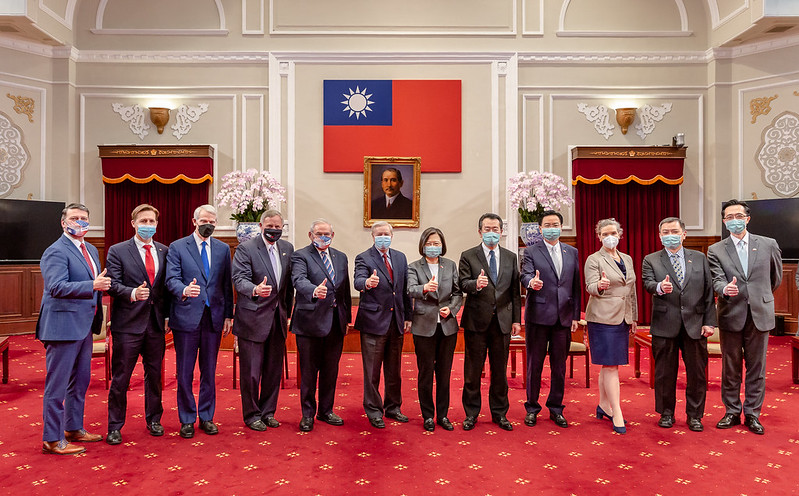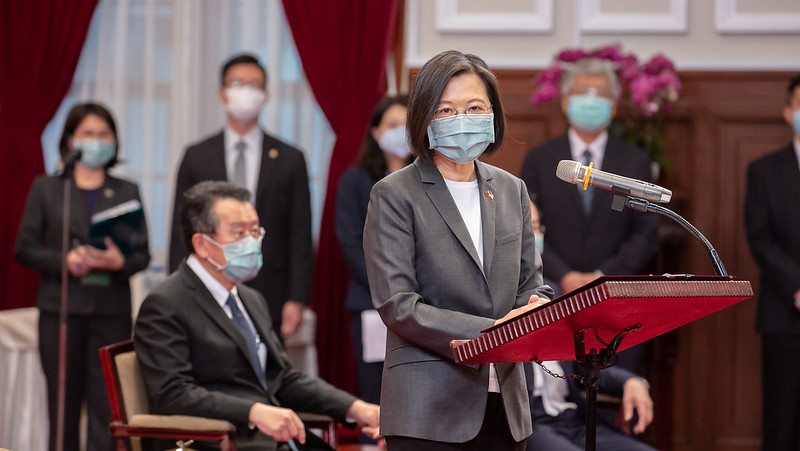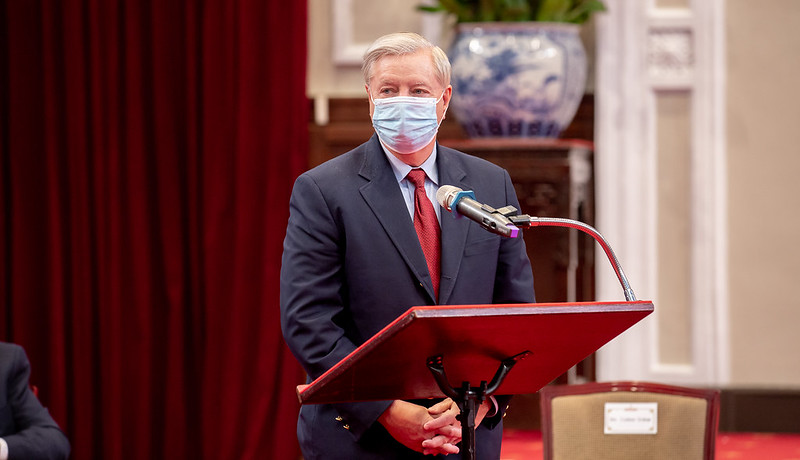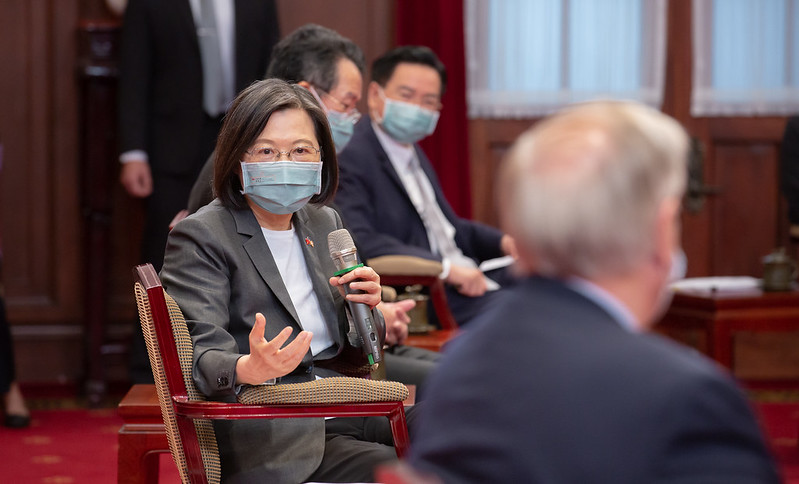News & activities
 News releases
News releases
On the morning of April 15, President Tsai Ing-wen received a senior congressional delegation from the United States led by Senator Lindsey Graham. President Tsai thanked the US Congress for its staunch bipartisan support for Taiwan, and said that Taiwan looks forward to playing an active role in the new US Indo-Pacific Strategy, working with the US to safeguard regional peace and stability and to stimulate further prosperity through economic cooperation and trade in the Indo-Pacific region.
A translation of President Tsai's remarks follows:
I extend a very warm welcome to you all. The members of this delegation represent the Senate and House of Representatives and hail from both political parties. This demonstrates that Taiwan enjoys strong bipartisan support throughout the US Congress. You are all good friends of Taiwan. Thank you for your enduring support for Taiwan in the US Congress, and for proactively advancing the development of Taiwan-US relations.
I am delighted to see Senator Graham and Senator [Robert] Menendez once again. Senator Graham visited Taiwan in 1999 as a US representative, and again in 2016, not long after I took office as president.
Senator Graham, in the past two decades, you have contributed much to enhancing Taiwan-US trade relations and staunchly supported Taiwan's international participation. You are a pillar of strength for Taiwan in the US Congress.
Senator Menendez has been co-chair of the Senate Taiwan Caucus since 2009 and has introduced numerous pro-Taiwan bills, strengthening Taiwan's security and elevating Taiwan-US relations. We are fortunate to count you among Taiwan's staunchest friends on Capitol Hill. I also recall that when I made a transit stop in the US in July 2019, Senator Menendez, you took the time to travel from Washington, DC, to New York to attend the welcome reception. This was a sincere show of support for Taiwan.
Thanks to your efforts in working with us, Taiwan and the US have been able to build a strong, rock-solid relationship. April 10 marked the 43rd anniversary of the Taiwan Relations Act, which makes your visit all the more meaningful. We believe that as Taiwan and the US continue to deepen exchanges, cooperation will yield even more fruitful results.
In the past few years, Taiwan and the US have worked together through such mechanisms as the Global Cooperation and Training Framework (GCTF) and the US-Taiwan Consultations on Democratic Governance in the Indo-Pacific Region to help promote democracy, good governance, and human rights throughout the region. Russia's invasion of Ukraine has proven that democracies must bolster their alliances. Collectively, we can defend ourselves from the threats posed by authoritarian nations that seek to disrupt regional peace.
Taiwan has always been a staunch, unwavering partner to the US in the Indo-Pacific region. We look forward to playing an active role in the new Indo-Pacific Strategy and working with the US and other like-minded countries to continue to safeguard regional peace and stability. Taiwan also looks forward to working with the US to jointly promote economic cooperation and trade in the Indo-Pacific region, stimulating further prosperity.
In closing, I once again welcome you to Taiwan and hope that we can continue our partnership with the US Congress to defend democratic values.
After the conclusion of President Tsai's remarks, Senators Lindsey Graham, Robert Menendez, Richard Burr, Robert Portman, and Ben Sasse and Representative Ronny Jackson each delivered remarks, the transcripts of which follow:
Senator Lindsey Graham:
Thank you, Madam President. Thank you for those kind words; it means a lot to all of us.
America has been politically divided. But I want you to know, when it comes to Taiwan, we're united. The Russian invasion of Ukraine and Communist Chinese provocative behavior has united America unlike any time I've seen in recent memory.
Why are we here? We're here to show support for what we love. We love freedom. We love the ability to achieve your individual dreams. We love the ability to pick our own leaders. We love the rule of law, and we hate the rule of gun.
It is often asked, 'What would America do if the Communist Chinese Party became more provocative against Taiwan?' I'm convinced we would stand for what we love. We would stand with you.
To abandon Taiwan would be to abandon democracy and freedom. It would be to abandon free trade. It would reward the worst in humanity.
As we're here today to show our support for Taiwan, all of us have our hearts broken regarding the people of Ukraine.
The people of Taiwan have sent almost 40 million US dollars' worth of assistance to the people of Ukraine. The Communist Chinese Party's President Xi has aided and abetted the war criminal Putin.
The CIA director gave a speech in America today – Mr. [William] Burns, who we all have a lot of faith in and support of – [in which he] said that President Xi was the solid partner of Putin in Ukraine.
What a contrast between the way the people of Taiwan and the Communist Party of China deal with Ukraine.
In economic terms, Taiwan is indispensable to the digital economy for the world and the United States. We hope to strengthen the ties even more economically. We hope you buy the [Boeing] 787 (made in South Carolina).
I just want to let you know that, while we've been watching the Ukraine on television, while it has broken our hearts, the American people understand how important you are to us.
There's a backlash growing in the world to thuggery and to the bad guys. There's a backlash in this world. NATO is getting stronger, not weaker. The Arabs and Israelis are working together to deal with the threat from Iran. I believe that there's a backlash growing against the oppression of the Chinese Communist Party worldwide.
So here's my promise to you and the Taiwanese people:
We're going to start making China pay a greater price for what they're doing all over the world. The support for Putin must come with a price. The never-ending cyberattacks on your economy and your people by the Communist Chinese need to come with a price.
I want you to be encouraged that the American people are more united than ever behind the idea of freedom.
Senator Robert Menendez:
Thank you very much for welcoming us. Madam President, to you and your distinguished Foreign Minister, your national security adviser, and your distinguished staff: we're thrilled to be here with the director of our offices here, who does an extraordinary job in promoting our relationship, and with a distinguished group of colleagues.
As a co-chair of the [Senate] Taiwan Caucus, I am proud to be back to reaffirm our rock-solid relationship with Taiwan. And I hope, Madam President, that our presence here – at a time in which the world is in conflict, where our attention could be called to many other places – that, in fact, this distinguished delegation is here in Taiwan at this time sends a powerful message to you and the Taiwanese people.
The delegation, as I know you appreciate, is not just diverse and bipartisan, but high ranking. Not only do you have the chairman of the Foreign Relations Committee here, you have the senior Republican on the Budget and Appropriations Committees, you have the senior Republican on the Homeland Security Committee, you have two of the most senior members of the Intelligence Committee, and the distinguished member from the House was on the Foreign [Affairs] Committee.
So you have a high-level delegation whose attention could be brought any place in the world – and for which many of our colleagues are right now in Europe, dealing with the challenges of Ukraine – but we understand that here in Taiwan, here in this region–this is where the future is.
The Chinese government issued to our offices and publicly a communique that they are very unhappy that we are here. But that did not dissuade us from coming. And it won't dissuade us in the future in supporting Taiwan.
Two final points: one is, we seek no conflict with China, as I believe Taiwan seeks no conflict with China.
In fact, the United States and the West invited China into the international order to be part of following international engagement and international rules. Unfortunately, it accepted the invitation on trade, but has not acted within the international order.
And so, the question before us is not a choice between the United States and China. It's a choice between what worlds do we want to live in.
Do we want to live in a world in which we are free to choose those who govern us? Do we want to live in a world where we are free because of our intellect and capacity to create great products and services, to be able to enjoy the benefits of that? Do we want to live in a world where we are free to ultimately decide how we worship, and so much more? Or do we seek to live in a world where our thoughts, our freedom, our ability to create, our ability to govern ourselves, [and] our ability to worship as we please [are] decided by someone else?
And so that is the choice before us, and it is in that spirit that we come here to Taiwan. Let me just say that, with Taiwan producing 90 percent of the world's high-end semiconductor products, it is a country of global significance, of global consequence, of global impact. And therefore, it should be understood that the security of Taiwan has a global impact for those who would wish it ill.
That in and of itself, in addition to the respect that we have for Taiwan as a country where the rule of law, transparency, the respect of the human individual, the choices that people get to make, would be sufficient to answer the question, 'Will we support Taiwan?' The answer is yes.
Senator Richard Burr:
Madam President, thank you for this audience and this time together with you and your leadership. I'm here to commend your leadership as it relates to the COVID challenge the world has faced.
I think it's relevant when you look at the Ukraine and you look at COVID, it's made every country in the world begin to rethink their supply chain needs. My hope and my belief is that, as the United States and Europe begin to recreate the architecture of the supply chain, that we look at this area of the world as an integrated part of that supply chain.
We have a rich history of partnership, but it's a partnership we think that can grow immensely. Madam President, you probably noticed that I have an America and Ukraine pin on my collar; it's no disrespect to Taiwan. This is a constant reminder to myself and to our partners around the world that we don't leave anybody in conflict. We're there as partners to the end.
Senator Robert Portman:
Thank you, Madam President. I didn't know I would have the opportunity to give a speech today. When you put a politician next to a microphone, sometimes it gets very long.
I'll try to avoid that. First, I want to thank you for welcoming us today, for your strong leadership, the courageous stances that you've taken on many issues, including encouraging your national security in the face of the threat from China.
And I want to thank you for hiring [Foreign] Minister [Joseph] Wu (吳釗燮), because we consider him to be an Ohio Buckeye. We have something in common – both Minister Wu and I taught at The Ohio State University. He was a distinguished PhD., I was just another politician.
We're here to support Taiwan, and to try to deepen an already-strong relationship as it relates to the economy, to our shared values, particularly the fact that you stand here, so close to China, as a democracy and a model to others.
We would like to deepen our partnership with you in the effort to increase the prosperity, the security, the economy of the Indo-Pacific area. This is why you must be a member of the Indo-Pacific Economic Framework that we are beginning, and why it would be very important for us to have a free trade agreement with Taiwan.
This is why we must deepen our bilateral economic relationship generally. Senator Graham talked about the 787s being made in South Carolina. He neglected to say that the engines are made in Ohio.
Thank you for your hospitality today and best of luck to you.
Senator Ben Sasse:
Thank you, Madam President, for hosting us. It is great to be with you. Kudos as well on your representative in Washington, DC. She does a great job advocating for you and telling your story.
I will be brief and just associate myself with the comments of my four colleagues thus far. But in addition, I would underscore the point about the commerce and the trade and the fraternity between our peoples. Taiwan is the eighth-largest trading partner of the United States. But many of those countries are the size of Japan and Germany. On a per capita basis, only our immediate neighbors of Canada and Mexico exceed our per capita trade with Taiwan, our third-largest trading partner at a per capita level.
Obviously, the vast majority of that is chips, and that is a testimony to a system of democratic capitalism that honors the dignity of people and fosters innovation. The Chinese Communist Party envies what you have in TSMC, but is unable to replicate it, because a system that puts people in jail for economic failure doesn't lead to innovation and creativity that comports with the dignity of people.
In closing, I would just say to the folks across the strait paying attention to this meeting [that] the world has noticed what has been happening in Ukraine, the world has noticed the dignity of the Ukrainian people who resist tyranny, and the world and America's citizens have noticed that the Chinese Communist Party gave the green light to Vladimir Putin to bully and attack and provoke his neighbors. The world knows what side the Chinese Communist Party leadership was on. And the world increasingly stands not only with Ukraine, but with Taiwan.
Representative Ronny Jackson:
Madam President, I just want to say thank you for your overwhelming hospitality from you and your country for our delegation, and welcoming us here today. I also want to take this opportunity to publicly thank Senator Graham and Senator Menendez for including me on this important visit to your country.
As a proud member of the Taiwan Caucus in the House of Representatives, you cannot have a bigger supporter from the great state of Texas than I am for your cause.
And as a member of the Armed Services Committee and the Foreign Affairs Committee, I understand how important this relationship is, both from a defense perspective and from an economic perspective.
Taiwan is a physically small country, but has an overwhelmingly huge economic impact globally, and that cannot be underestimated.
As I would say, it can't be overstated how important Taiwan is globally to all of us. I would say as a member of the House of Representatives [from Texas], I also want to thank Taiwan for the relationship that we've developed on an agricultural basis.
Many of your agricultural products come from the United States, and many come from my state of Texas. So I'm very interested in making sure that we support you in any way that we can in your cause, but also to continue to grow the US-Taiwan relationship, both from a defense standpoint and economically. And so to that end, I will be with you all the way.
The delegation led by Senator Graham, ranking member on the Senate Committee on the Budget, was accompanied to the Presidential Office by American Institute in Taiwan Taipei Office Director Sandra Oudkirk.












